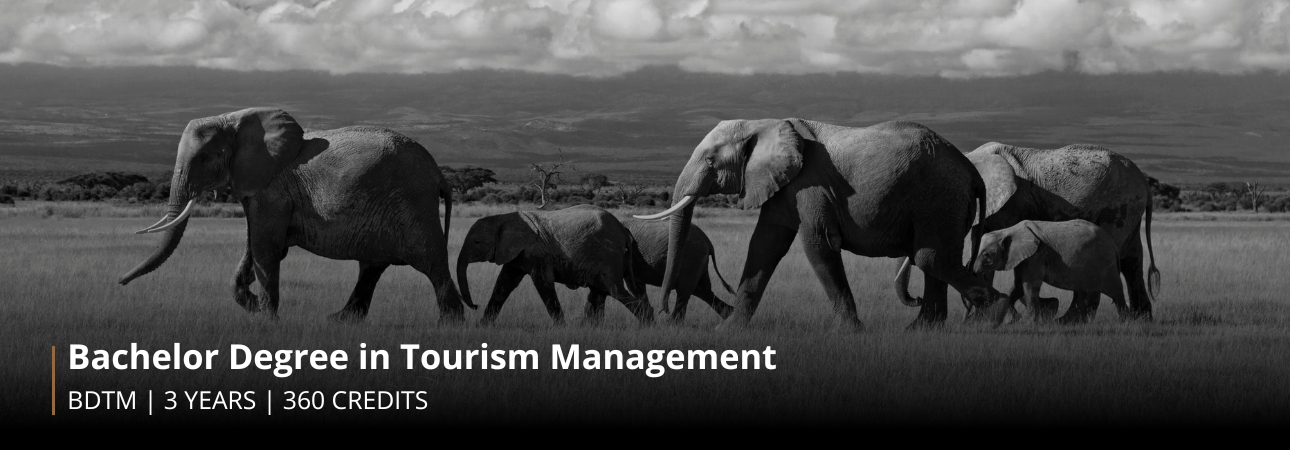Programme Overview
The Bachelor Degree in Tourism Management provides middle-level tourism officers with the necessary skills and knowledge to work in various sectors, including government, NGOs, local communities, private companies, and international agencies.
The objectives of this program are to equip students with knowledge and practical competencies for effective tourism management, facilitate individual learning through flexible scheduling, encourage self-directed learning, offer various modules, facilitate efficient educational exchange between faculty and students, implement professional training programs, and make training needs clear and specific for efficient resource utilization.
Programme structure
| Semester 1 |
Semester 2 |
| Plant Interpretations (6 credits) |
Tourism Statistics (9 credits) |
| Invertebrate Interpretations (6 credits) |
Behavioural Ecology (9 credits) |
| Development Studies (6 credits) |
Principles of Wildlife Ecology (9 credits) |
| Communication Skills (6 credits) |
Tour Guiding and Interpretation Skills (12 credits) |
| Computer Application in Tourism (6 credits) |
Computer Application in Tourism (6 credits) Ballistics (6 credits) |
| Paramilitary Techniques (9 credits) |
| Semester 3 |
Semester 4 |
| First Aid and Tourism Outdoor Skills (9 credits) |
Tour and Travel Management (12 credits) |
| Heritage Management (9 credits) |
Tourism Destination Management (9 credits) |
| Tourism Policies, Legislation and Governance (12 credits) |
Tourism Planning and Development (12 credits) |
| Customer Care Skills in Tourism (9 credits) |
Customer Care Skills in Tourism (9 credits) Hospitality Operations Management (12 credits) |
| Protected Area Management (12 credits) |
Principles of Sustainable Tourism (9 credits) |
| Principles of Tourism Management (9 credits) |
GIS and Remote Sensing (9 credits) |
| Paramilitary Obstacle Training (9 credits) |
Applied Tourism Information Systems (6 credits) |
| Semester 5 |
Semester 6 |
| Tourism Economics (6 credits) |
Organization Management (9 credits) |
| Tourism Entrepreneurship (9 credits) |
Business Law and Ethics (6 credits) |
| Environmental Impact Assessment (6 credits) |
Project Planning and Management (9 credits) |
| Principles of Financial Accounting (6 credits) |
Research Project (30 credits) |
| Event Management (6 credits) |
| Principles of Tourism Management (9 credits) |
| Research Methodology (12 credits) |
General requirements
- Have successfully completed form six (vi) with principal passes in science subjects.
- Have a good command of English language, both in speaking and writing.
Specific requirements
- Two principal passes in either of the following science subjects: Biology, Chemistry, Physics, Geography, Agriculture, Computer Science, Nutrition or Advanced Mathematics with minimum aggregate of 4.0 points.
- An ordinary Diploma in Wildlife Management, Wildlife Tourism, Tour Guiding Operations, Tour Guiding & Operations Fisheries, General Agriculture, Agriculture Production, Livestock, Forestry, Bee Keeping, Environmental Health Science, Environmental and Coastal Resources Management, Animal Health and Production, Range Management, Crop Production, Land Use Planning, Horticulture, Agriculture and Natural Resources Management, Environmental Science and Development, Aquaculture, Fisheries Management and Technology, Environmental Health Sciences, Food Production, Aquaculture Technology, Community Development, Science & Laboratory Technology, Veterinary Laboratory Technology, Fisheries Management & Technology, Fisheries Science & Technology, Forest Industries Technology, Geo informatics for Natural Resources Management, and Food & Human Nutrition with a minimum GPA of 3.0 or an average of B+ or Upper Second Class for classified non-NTA Diploma.


